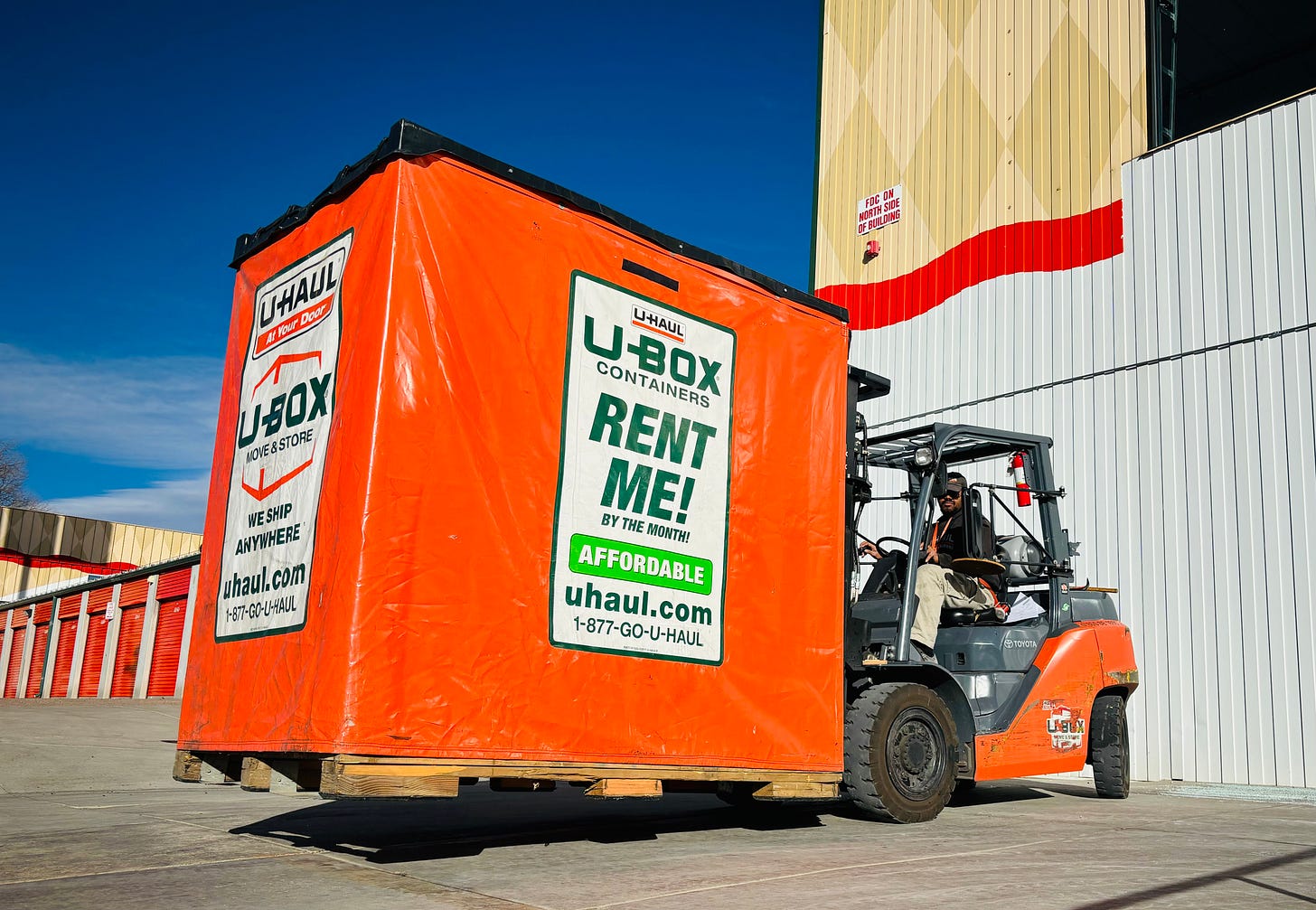How Modern Tech is Rejigging Our Lives
A few things I've learned from buying a new home and moving to a new city--
I’ve been busy the last month selling my old house, finding and buying another, and moving into the new digs. As a result, I haven’t had much time for this blog. But in the process I’ve found out about a lot of new things that the World Wide Web and modern computers can do, that have made me somewhat more optimistic about Canada’s transition away from the chaos machine due South.
Shipping Furniture is a Lot Easier
Years ago, I moved to my previous home using a moving company, and even though it was only for a couple blocks I found it relatively expensive. This time my significant other suggested we use a service from U-Haul where it drops off a “pod” which we load and unload ourselves according to our own time frame. The company’s job boils down to transporting and storing the pods for a fixed fee based on moves and how many months we have them in their warehouse.
In the middle of this process (we had four pods filled with stuff), it struck me that this is exactly the same as the container systems that companies use to ship products all over the world. The important thing that I learned is that the system could only really work by using computers and the World Wide Web to keep track of the thousands of cubes that are being shipped all over North America or stored in warehouses at any given time.

I raise this issue because it strikes me that as Canada cuts our economic ties with the USA, the use of computer technology and the Web have made making deals with other countries and shipping products back and forth is a whole lot easier now than it was back in 1988 when Brian Mulroney and Ronald Reagan signed the original free trade agreement.
Signing Documents is a Whole Lot Easier Too
Another thing that struck me was how much easier it is to perform certain legal tasks. The estate agents who sold our old home and helped us buy our new one, and the lawyers in both processes did all their document signing through the web using our cell phones. In fact, everything we did got done without having to actually meet face-to-face and sign documents (I never met any of our lawyers face-to-face). In fact, things were so stream-lined that we closed the house we sold on the same day that we closed the house we bought.
In addition, the process of paying for the house was also very easy. Without getting into too much detail, all I had to do was get a piece of paper from a branch (not my personal one) of my credit union and take it to a branch (not their business one) of the bank used by my law firm and they were able to get the money to the escrow account within a few hours. Again, this sort of easy integration of financial systems obviously seems to me to be a consumer-level application of something that can be used by companies when they buy and sell internationally.
Finding the Right House Digitally
Another thing that surprised me was the way we found the property we bought. In effect, we purchased a property without having ever set a foot in the building. We found an estate agent online and went down to Windsor for a few days to basically interview the guy, made a decision that he was trustworthy, and then looked at eight homes with him, which allowed him to ‘fine tune’ his understanding of what we were looking for.
We made a couple bids on houses we’d seen, but they were rejected. But then found a property on a Real Estate website that looked like what we were looking for. We evaluated it’s walkability score with the website “WalkScore.com” and it told us that the area is very walkable, bike-friendly, and has good access to public transit. We had the house inspected by a highly-recommended service, which gave us a detailed list of the elements of the house that needs work and decided that at the price point we were getting, we could afford both the building and the immediately-needed repairs. In addition, our estate agent did walk-throughs and filmed what he saw on his phone and then sent the results to us, and then answered our questions. The result was pretty much what we were looking for.
Of course, this was taking a lot ‘on faith’, but it’s important to understand that lawyers, estate agents, and building inspectors are all regulated professions. This means that they are all legally required to specifically do their ‘due diligence’ to represent our interests in all their dealings with us. In effect, this is an example—on the personal level—of the ‘rules-based order’ that people like Trump and Putin want to rip to pieces, but which has allowed the world economy to dramatically grow in the last couple decades.
Automation is Useful, But the Human Touch is Still Essential
One thing that this experience really drove home was that while automation dramatically helps the complex process of selling and buying a home, and moving to a new city—few of the systems worked flawlessly. The pod-management system tried to reroute our possessions to a warehouse on Windsor street in Mississauga, instead of the one in the city of Windsor. The internet service provider system for some reason sent our new modem to the wrong mailing address. The drug store chain that deals with our prescriptions kept telling our new pharmacy to fill some of our old prescriptions instead of the current ones. The company that manages my pension cheques has a website that simply refused to allow me to change my mailing address. Etc, etc.
In each case, the problem was resolved by someone we could phone and actually talk to. What this tells me is that while automation has made wading through these issues a lot faster and easier—there still seems to be a need to have human beings that can be easily accessed in order to deal with what seems to be inevitable glitches. What this tells me is that while businesses may think that they can get rid of their service staff through the use of AI, there still needs to be people you can call when things don’t go exactly as the systems assume they should.
Geography Isn’t as Important as it Used to be
I have serious allergies and have been treated by an allergist for a couple years. I’ve never met her face-to-face, instead we use video chats. This started during the pandemic, but has continued since then. During my last consult, I mentioned that I was leaving Guelph but she said this would be no problem, as she has patients all over the province and all I had to do was give her office the contact info for my new pharmacy and we’d be fine for the future.
Of course, our General Practitioner can’t do the same thing—she sometimes needs to meet us face-to-face. But she understands how difficult it is to find a doctor, so she said she’d continue to help with our on-going prescriptions until we find a local GP. She also said that there are some good walk-in clinics in our new neighbourhood that can fill the gap in the meantime.
In much the same way, the lawyers I used to both sell and buy our homes do work through the phone and web all across Ontario—and don’t actually require clients to actually meet them face-to-face. Having said that, I found their staff extremely easy to get ahold of on the phone and ready to help us with any of the intricacies of the process.
Economies Thrive Where Rules Prevail—Kleptocrats Benefit From Ambiguity and Arbitrary Rule
All the time my partner and I have been working through this tremendous life-change, the backdrop of the news has been about America’s decision to “monetize its hegemony” (to quote the Prime Minister). Tariffs have been raised, dropped, paused, and annexation threats have come and gone too. For me, it was interesting to contrast the constantly-shifting. macro-economic news spewing from the United States with the well-established and professionally-regulated rules that my estate agents, movers, lawyers, etc, were all working from. Everything only worked because each individual knew exactly what the rules are and no one tried to ‘fiddle the system’. The efficiencies I’ve catalogued in this article can only come about because Canada is a ‘rules-based' society.
In contrast, Trump and co have been purposely screwing-around with established treaties in order to squeeze as many concessions as possible out of countries like Canada. Indeed, my significant other has a pod in a warehouse in Detroit and some other business to deal with in the US, and she’s been wracking her brain about whether or not she can safely cross the border. Indeed, we’ve both concluded that it probably wouldn’t be safe for me to even go for a day trip to Detroit because of the stuff I’ve written on this blog. Neither of us want me thrown into a van by someone in a sky mask and kept in a secret prison because I’ve said something ‘bad’ about the King of the USA.

My Non-Expert Conclusion
I’m a boomer who tries to keep up with the modern world, but I was quite surprised by how much modern techology has helped with our ‘lightning’ house-hunting and relocation job that took only a few weeks. Sitting in my second-floor study of my new home I can honestly say that neither my significant other nor I have any regrets. Instead, what I’ve learned about how much the world has changed in the last 40 years tells me that it will be a lot easier for the Canadian economy to disengage from the USA and connect with the rest of the world than it could in the time of Reagan and Mulroney. There will be ‘bumps’ in the road, but I’m hopeful that it won’t be the catastrophe that many of us feared it might be when Donny Smallhands decided that it was time for the USA to commit economic suicide.


Congratulations on the move!